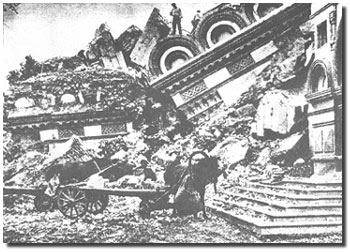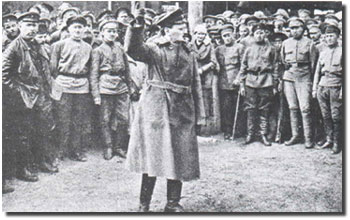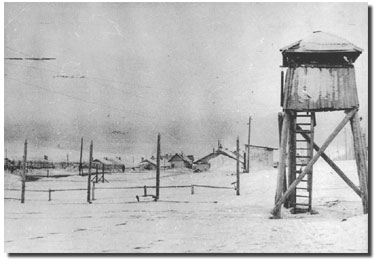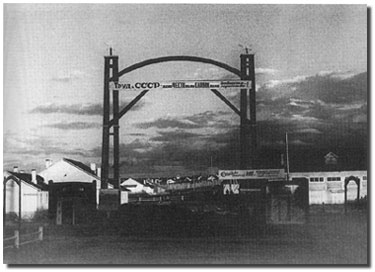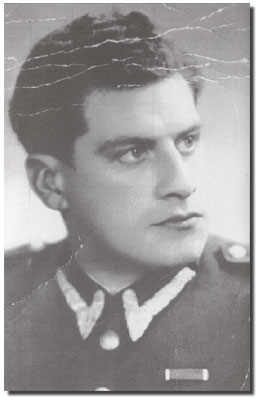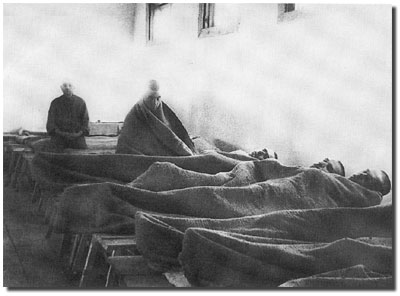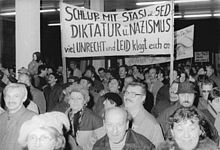See:
Gulag: Soviet Forced Labor Camps and the Struggle for Freedom
http://gulaghistory.org/nps/onlineexhibit/stalin/
[short excerpt]
The term “GULAG” is an acronym for the Soviet bureaucratic institution, Glavnoe Upravlenie ispravitel’no-trudovykh LAGerei (Main Administration of Corrective Labor Camps), that operated the Soviet system of forced labor camps in the Stalin era. Since the publication of Aleksandr Solzhenitsyn’s The Gulag Archipelago in 1973, the term has come to represent the entire Soviet forced labor penal system. Concentration camps were created in the Soviet Union shortly after the 1917 revolution, but the system grew to tremendous proportions during the course of Stalin’s campaign ... .
Gulag camps existed throughout the Soviet Union, but the largest camps lay in the most extreme geographical and climatic regions of the country from the Arctic north to the Siberian east and the Central Asian south.
[end of short excerpt]
And also see:
http://www.come-and-hear.com/dilling/whois.html
Foreword to the 1964 EditionPublished by
The Elizabeth Dilling FoundationBox 659, Chicago 90
Who is Elizabeth Dilling?
Our family trip to Red Russia in 1931 started my dedication to anti-Communism. We were taken behind the scenes by friends working for the Soviet Government and saw deplorable conditions, first hand.
We were appalled, not only at the forced labor, the squalid crowded living quarters, the breadline rationcard workers' stores, the mothers pushing wheelbarrows and the begging children of the State nurseries besieging us.
The open virulent anti-Christ campaign, everywhere, was a shock. In public places were the tirades by loud speaker, in Russian (our friends translated). Atheist cartoons representing Christ as a villain, a drunk, the object of a cannibalistic orgy (Holy Communion); as an oppressor of labor; again as trash being dumped from a wheelbarrow by the Soviet "Five-Year-Plan"--these lurid cartoons filled the big bulletin boards in the churches our Soviet guides took us to visit.
In the Museum of the Revolution we were shown a huge world map. As our Guide turned a switch, lights came on indicating the places all over the world where Communist Party headquarters were then functioning. Proudly our Guide announced: "Our world revolution will start with China and end with the UNITED STATES".
"O, NO! Not THAT", was my thought. But, country by country, the boast has been steadily advancing. I took pictures of the anti-Christ posters on the porch of St. Isaac's Cathedral in Leningrad.
Russia Changes My Life
We were taken to the beautiful Church of the Redeemer in Moscow which was then, we were told, about to be dynamited to make way for a "Palace of Soviets". There was a display of full-sized mannikins dressed in the robes of the Church carrying on the Good Friday Footwashing ceremony. Our Guide rasped: "This was to show that if the Archbishop could wash the feet of the humble priest the poor should endure their sufferings without complaint! Religion was always for the suppression of the people, to keep them working from dawn to late at night under the lash!"
I thought of our Savior washing the feet of His Disciples as an example, and telling them that he who would be great among you should be the servant of all (John 13:13-15; Matt. 23:11). I glanced up at the exquisite stained glass window of Christ, about to be demolished, and a little tear trickled down my cheek as I thought: "I can never hate You like that!" (I did not know then that the Pharisee Talmud gives Him FIVE sadistic deaths today).
Staying at my hotel was the representative of a foreign country. He told me of the police terror; how the last manager of that hotel had been whisked off in the middle of the night by the "Black Mariah"--like millions of others never to be seen again. Some of our party had been taken to the police station; they had laughed in a movie theatre. They were released when they explained that they had laughed at a private joke, not at the picture (which was Soviet-made). After this, and more, I returned to the "NICE" North Shore of Chicago where the "intelligentsia" were rendering brainwashed reverence to the "great Soviet Experiment".
Lecturing
Behind the backs of the careless Guides I had taken movies of the rickety trains, etc., in Russia. By chance I started showing these movies to patriotic audiences, my husband running the projector as I told the story. Articles written for a little local newspaper were reprinted by the DAR and larger and larger groups called for my talks: District meetings of the Legion; the Military Intelligence; churches from coast to coast. I was recommended for all Chambers of Commerce, and spoke for the Minneapolis, Cleveland, Los Angeles, etc., groups. I broadcast over the Moody Bible Institute radio and its head became my closest friend to her death. Dr. Ironside introduced me as the only woman he had ever asked to occupy his pulpit in the Moody Church. I spoke in the great church of Dr. W. B. Riley, organizer of the World Fundamentalist Assn., my defender to his death. I frequently spoke in Detroit churches and on numerous occasions was entertained at the executives' table at the Ford plant. Henry Ford (who never changed his mind about the role of Jewry) had me write (1939) a report on the U. of Michigan (80 pages). He contributed that year $5,000 to the cost of my office labor which cost $12,000 that year. The head of the National Sojourners had me airmail my two books to Sen. Royal Copeland to give to Vice Pres. Garner who, I was told, stayed up all night reading them and had his friend Cong. Dies of Texas start up the Dies Committee on Un-American Activities (later called the House Com.) as a result.
The hub of world Jewish anti-Christ power, the financial and industrial power best described in Rev. 18:11-, is the AMERICAN JEWISH COMMITTEE with its B'nai B'rith brotherhood, and its "secret police", smear and ruin arm, the Anti-Defamation League. After having pushed a reluctant USA into World War II--to spread Communism across the earth, and with its first world base, Soviet Russia, as our "ally", it was decided to crush all ANTI-COMMUNISTS by trying them as "Fascists, Nazis". A series of indictments against some 30 anti-Communists, of which I was one, was engineered by the American Jewish Committee, in 1942, 1943, 1944. The 1942 indictment never came to trial. The 1943 indictment was dismissed in Washington by Judge Adkins. Only the 1944 indictment went to trial under a stooge judge Eicher. An unbelievable farce was staged without any legality or fact. After the death of judge Eicher, the case was dismissed by Judge Bolitha Laws with the scathing denunciation that it had been a crime to hold those people on trial all that time without a single piece of evidence in accordance with the charge being introduced by the prosecution against ANY defendant. The Communist press had been gloating that the "sedition trial" was part of the "Moscow Purge trials" then in session all over Europe. I reproduced the item on one of my Bulletins, sent to every Congressman.
Background of E. D.
Travel in more than 60 countries convinced me that the USA had the greatest system of government, and was the most fortunate nation on earth. I did not want it Sovietized, collectivized. Careful research and documentation have resulted in the fact that nothing I have ever printed has, to date, been refuted by friend or foe.
BORN in CHICAGO, daughter of Dr. L. Kirkpatrick, physician and surgeon, of Virginian, Scotch-Irish, Presbyterian ancestry. My mother. Elizabeth Harding, descended from a long line of Anglican bishops thru her father. Her mother, Jane Musquet, was of English-French descent with a Catholic priest uncle in Paris. I married Albert Dilling, of Norwegian Lutheran ancestry. Mother of two children, married and active in Episcopal Church, of which I am a communicant. Graduate of the Starrett School for Girls, Chicago Normal School; Univ. of Chicago student, before and after marriage; pupil of world's greatest harpist, Alberto Salvi; was concert harpist and pres. of Chicago Harpists' Society. The RUSSIAN trip ended a musical career and a "nice" suburbanite existence.
WRITINGS
- The famous RED NETWORK -- A Who's Who and Handbook of Radicalism for Patriots, of which some 100.000 copies have circled the globe, unrefuted factually by friend or foe.
- The ROOSEVELT RED RECORD AND ITS BACKGROUND -- a second Red Network. of over 400 pages with two indexes.
- THE OCTOPUS -- on the ramifications of Jewish power.
- [ THE PLOT AGAINST CHRISTIANITY, republished as THE JEWISH RELIGION: ITS INFLUENCE TODAY -- directly addressing the teachings of Judaism and its influence in the affairs of the modern world ]
- A Bimonthly BULLETIN SERVICE, etc., etc.
http://www.come-and-hear.com/dilling/
Long Night of the Black Marias

The Communists wasted no time after seizing the organs of government in Soviet Russia. Almost immediately the arrests began. The Gulag began to overflow with prisoners. The pain grew and grew. Torrents of blood were spilled. Only the Jews were exempt, and even a few of them were taken away:
The persons most hated and reviled by the Communist Jews who ran the Gulag prisons were the Christians, the Bible-believers, the faithful Gentiles. Lenin, the Jewish Commissar who had become the Kremlin's new master, demanded "merciless suppression" of the "counterrevolutionaries and other persons." Christians, no matter how meek, gentle, and nonviolent, certainly fit into that broad, all-encompassing category of "other persons!"
Harmful Insects to be PurgedIn his essay, "How to Organize the Competition" (January 7 and 10, 1918), Lenin proclaimed the common, united purpose of "purging the Russian land of all kinds of harmful insects."The Jewish overlords, led by Lenin and Trotsky, (later, Kaganovich, and Beria) were self-appointed exterminators. Some 66 million "insects" (people, many of whom were Christians) were the vermin who had to be exterminated. The "parasites" must vanish. It was all for the good of building the new Jewish Utopia, a global-wide One World Order to be ruled by the Jewish clique, which euphemistically called itself the "Vanguard."
Solzhenitsyn, in his classic book, Gulag Archipelago, writes that all those active in Christian churches were deemed "insects" and "parasites," even those who sang in church choirs. But, of course, there were also many other groups considered too dangerous to be allowed to exist. And so, factory workers, artists, teachers, youth, farmers, engineers—millions of people from just about every social category—were culled out and taken away to prison labor camps. Many of these hapless victims were driven to the fateful kangaroo courts in the despised and feared Black Marias. The Black Marias Came Out At NightAh, yes, the Black Marias. They usually came at night. They found their victims at home, in their apartments and flats, or on the street, in bars and in theatres. They worked off lists, and oh, how lengthy some lists were. Resisters were pummeled, beaten, sometimes bayoneted and dragged into the long, black, box-car, limo-like automobiles that came to be called the "Black Marias."In a typical night's work, the Communist thugs would round up fourteen to sixteen victims and crowd them like sardines into the austere compartments of the Black Marias. Solzhenitsyn tells the sad story of one young woman, a secretary, dragged into a Black Maria car. Innocent and a virgin, guilty of nothing more than the fact that she had refused to give in to the sexual demands of a Communist bureaucrat, the naive girl was attacked inside the crowded cab by a half dozen filthy gangsters. They stripped her of her purse and shoes, ripped her dress, and their hands went all over her body. Raped and battered, the girl was a physical and emotional wreck by the time the Black Maria rolled into the police courtyard where she and the others were ordered out. The girl began to whimper, cry, and complain about her treatment, but the guard simply shrugged his shoulders and told her to move on. He knew that what awaited the girl in the gulag prison was even more hellish than the savage pounding she had just taken. In any event, these things happened every night, seven nights a week. It was the nature of the beast. The beast demanded victims. The innocence of the arrested was no excuse. Chance, randomness, also had its premium in the lives—and deaths—of the millions of "selectees" chosen to be human chattel, slaves of the beast and its Gulag. An Eye For An EyeIt was not only in Soviet Russia and its conquered republics that the prisons filled up with slaves. In occupied Eastern Europe, too, the Jews who ran Poland, Czechoslovakia, Hungary, Romania, and other nations that had fallen under the jackboots of the Soviets, set up concentration camps. In An Eye For An Eye, heartsick, prize-winning Jewish reporter Jonathan Sack documents the cruel fate of thousands of men, women, and children whose only "crime" was that they had the misfortune to have a German surname. The Jews were determined to get their revenge for Nazi crimes, and these poor souls, even little children, babies, and old men and women who had had nothing at all to do with the Nazis—many of them had even suffered themselves under Nazi occupation—would just have to serve as scapegoats. [Editor note: the Nazis were totally Diabolically evil, but nevertheless the "hoaxacaust" is a lie. The Jews, even though the Nazis hated them, were allies with the Nazis for the invasion of Palestine by the Jews, which is an absolute Antichrist evil. God forbade the Holy Land to the Jews forever, because of the Jews' sins of Deicide and perfidy.]
And so, the arrests, the torture, and the slaughter began in earnest. Women were raped and brutalized by the vicious Jewish guards who ran the Communist camps, boys were sodomized, and children molested and ritually sacrificed in what can only be described as some type of medieval Jewish, satanic, kabbalistic rites.
"You Have Come Here to Die"Sack's stunning reports even introduce us to a Jewish woman prison camp commandant, but especially distressing is Sack's numbing account of the genocidal savagery of Solomon "Schlomo" Morel. Morel, a Polish Jew, was surely the inhuman equal of Ivan the Terrible or, say, Joseph Mengele. Morel liked to greet each new trainload or truckload of German-surnamed prisoners. "You have come here to die," the strutting, military-uniformed, polished boot-wearing Morel would announce to the heart-fallen men, women, and children, "and I shall be your executioner!"
The Past as a Picture of an Ominous Future?Why, some might ask, is it necessary for me to remind you, dear reader, of these tragic and awful things? Why not just forget the past? Let bygones be bygones.It has often been said that he who forgets the past is doomed to repeat it. The past is prologue to the future. The Old Testament tells us there is nothing new under the sun. What has happened before could—and does—happen again.
This, then, is a warning. Already, we can see the storm clouds gathering. Lightning is flashing. America has become the destined New Rome and Israel is the driver of that destiny. Around the world, America is the proxy Rottweiler for the Jews, their attack dog. Zionist Jews covertly rule behind the scenes in Washington, D.C. They control our media and news, our entertainment industries, our education establishment, and our book and magazine publishing. They own our computer and high tech corporations. With the assistance of the CIA and FBI, the Israeli Mossad and its ADL cohorts are now monitoring what we say on the internet. Again, there is talk of a Zionist Kingdom on planet earth, and the buzz among high-level Jews is their plot to rid the earth of the goyim (Gentiles), the inferior "insects"—first, the Palestinians and Arabs and, next, the Christians. Not the average "Christian," mind you—only the Bible—believer who understands (Daniel 12:10). The other "Christians" the Zionist Jewish elite already have in their back pocket. These dark forces have worked diligently for centuries to usher in a New World Zionist Order. With their iron grip on the world's media and banking and by using the armed might and diplomatic influence of their powerful proxy, America (Revelation 17), they intend to conquer and seize total global domination. Amazingly, they are on the threshold of accomplishing this incredible feat. A Special Message to Zionists and to All JewsBut, I warn these dark forces: In attacking God's people, true Christian believers, and in working to destroy all vestiges of freedom and liberty in America and the world, you are unwittingly undoing yourself. Be assured: God will avenge crimes committed against His people.Please, I beg you: Think about what you are doing. Do not feed the curse that is already upon you. In Illuminist Revolutionary France, in Communist Russia, and elsewhere, your Protocols have been wildly successful. They have vaulted you into the upper echelons of power. Now, you believe yourself to be gods on earth. But you are mistaken. You are mere men, born sinners as are all men. My message, then, to Zionist Jews, is: Do not lie to yourself. Only the Truth will save you. And only Jesus Christ is that Truth. He has set before you Death and Life. Therefore, choose Life through Him! If you refuse, then do not be surprised when someday, in a future, long night of the Black Marias, the Black Marias come for YOU. But you, as an individual Jewish man or woman, do not have to be a victim. You do not have to participate in The Lie. You do not have to join in the unholy, ages-old plot and scheme of your Zionist leaders. You can put an end to the long night. We, Gentiles and, yes, some Jews, who know Christ Jesus are your only true friends. Call on us before it is too late, and believe in our Savior, Jesus. He is able to deliver you and us. We promise: He will not fail you! |






